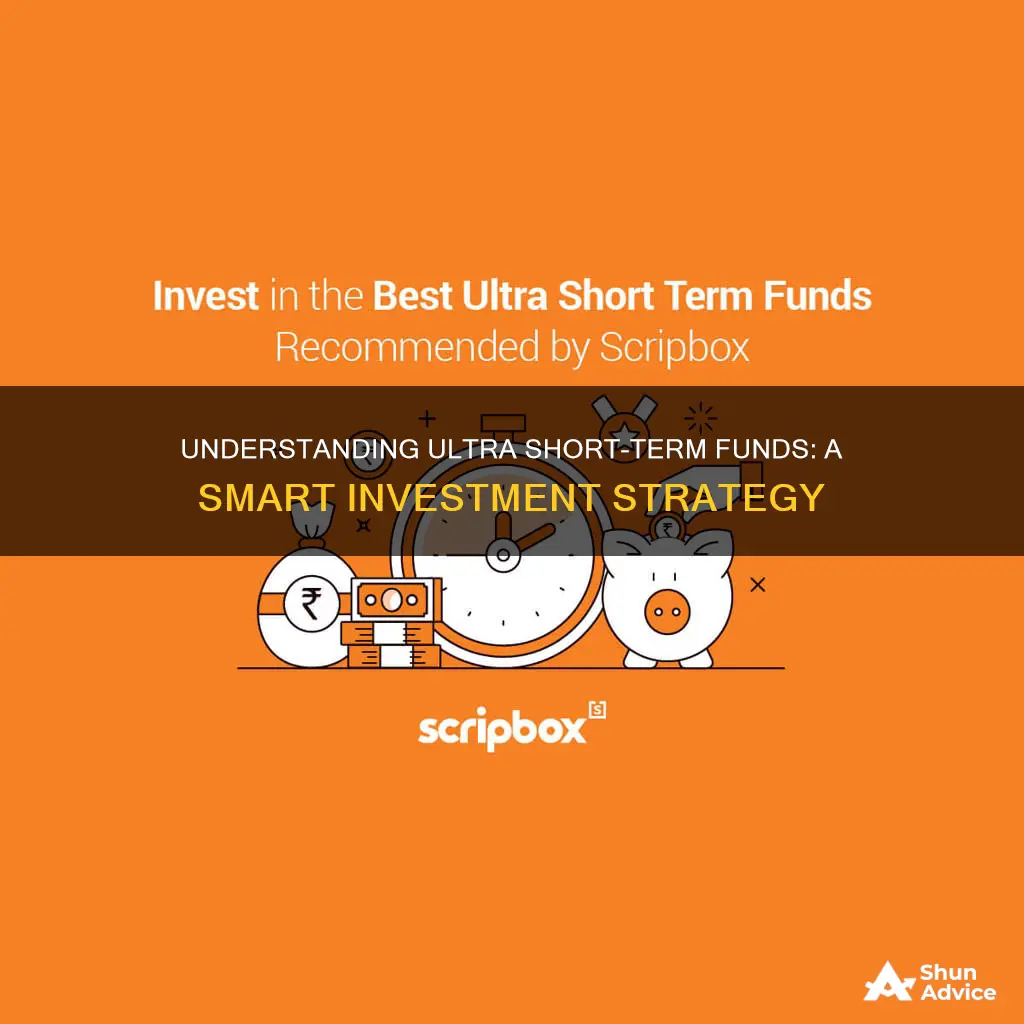
Ultra short-term mutual funds are ideal for investors who want to invest for a short period of time, usually between one week and 18 months. These funds are suitable for those who want to meet certain financial goals in six months or less and are looking for an alternative to bank accounts and deposits. Ultra short-term funds are also a good option for investors who want to park their capital for a short period of time, such as a couple of weeks or a few months.
These funds invest in a combination of debt instruments, including treasury bills, certificates of deposit, commercial papers, and corporate bonds. They have a residual maturity of between six months and one year. While ultra short-term funds are not entirely immune to market conditions, they are considered low-risk because of their short duration and high-quality debt instruments.
When compared to liquid funds, ultra short-term funds offer higher returns, typically ranging from 7% to 9%. They also offer higher liquidity than any other class of funds with long investment horizons.
Some of the top ultra short-term mutual funds in India include:
- Aditya Birla Sun Life Savings Fund
- SBI Magnum Ultra Short Duration Fund
- ICICI Prudential Ultra Short Term Fund
- Invesco India Ultra Short Term Fund
- UTI Ultra Short Term Fund
- Nippon India Ultra Short Duration Fund
| Characteristics | Values |
|---|---|
| Investment type | Debt funds |
| Investment duration | 1 week to 18 months |
| Investment horizon | 3-6 months |
| Risk level | Low |
| Returns | 7-9% |
| Liquidity | High |
| Taxation | Short-term or long-term capital gains tax |
What You'll Learn

How to choose the best ultra-short-term mutual funds
Ultra short-term funds are fixed-income debt fund schemes that invest in debt and money market assets for a period of a week to 18 months. They are suitable for investors who want to invest for a short period of time.
- Risk: Unlike other debt funds, ultra-short funds are immune to interest rate risks due to their short maturity and underlying assets. However, they are riskier than liquid funds. Therefore, investors should consider their risk appetite when choosing ultra-short funds.
- Return: Ultra-short funds offer higher returns compared to other short-term funds, such as liquid funds. However, they do not offer guaranteed returns, and their Net Asset Value (NAV) tends to fall with rising interest rates. Thus, they are suitable for a falling interest rate regime.
- Costs: Ultra-short funds have an expense ratio, like any other mutual fund. To recover the funds lost due to interest rate fluctuations, consider the overall returns generated, with a long holding period and a lower expense ratio.
- Horizon: Ultra-short funds earn from the coupon of short-term underlying assets, and their prices can change daily. They are more volatile than liquid funds, so a short time frame may not generate adequate returns.
Some of the best ultra-short-term mutual funds in India include:
- Nippon India Ultra Short Duration Fund
- Axis Ultra Short Duration Fund
- ICICI Prudential Ultra Short Term Fund
- Tata Ultra Short Term Fund
- Mirae Asset Ultra Short Duration Fund
- Sundaram Ultra Short Duration Fund
- Mahindra Manulife Ultra Short Duration Fund
- IDBI Ultra Short Term Fund
- Baroda BNP Paribas Ultra Short Duration Fund
- DSP Ultra Short Fund
- UTI Ultra Short Duration Fund
- HDFC Ultra Short Term Fund
- Invesco India Ultra Short Duration Fund
These funds offer high liquidity, ensure short-term goal fulfilment, provide safety from interest rate volatility, and offer sufficient returns without exit loads. However, investors should carefully consider the risks involved, such as the risk of default and capital gains taxes.
A Beginner's Guide to Investing in Index Funds (VFINX)
You may want to see also

Understanding the risks involved
While ultra-short-term funds are considered low-risk, they are not entirely risk-free. Here are some of the risks involved:
Interest Rate Risk
Ultra-short-term funds are vulnerable to interest rate changes. If interest rates rise, the fund's existing holdings may depreciate, reducing returns. Conversely, falling interest rates could result in lower revenue for investors. In high-interest-rate environments, certain types of ultra-short-term funds may be more susceptible to losses.
Credit Risk
Credit risk can lead to a permanent reduction in your investment. This risk is present even in ultra-short-term funds, despite their low interest rate risk. It is important to assess the credit quality of the fund's portfolio to mitigate this risk. Funds that invest in lower-rated debt or private-label mortgage-backed securities, for example, tend to be subject to higher levels of investment risk.
Default Risk
While the risk involved in these funds is low due to the short duration of the investment, default risk still exists.
Market Risk
Ultra-short-term funds are not entirely immune to market conditions. Economic downturns or financial crises can impact the performance of these funds, resulting in either returns or temporary losses.
Taxation
The tax treatment of ultra-short-term funds varies depending on the duration of the investment. Capital gains from these funds are taxed as short-term or long-term, depending on the holding period. For investments held less than three years, gains are taxed at the investor's applicable income tax slab rate. For investments held three years or longer, long-term capital gains tax applies.
No Guaranteed Returns
Ultra-short-term funds do not guarantee capital safety or assured returns. While they aim for stability, the returns are subject to market conditions.
Strategies for Picking a Hedge Fund to Invest In
You may want to see also

Taxation and other costs
Ultra short-term mutual funds are subject to taxation, and the rate of taxation is determined by the length of time an investor remains invested in the fund, known as the holding period. Capital gains made within three years are considered short-term capital gains (STCG) and are taxed according to the investor's income slab. Capital gains earned over three years are considered long-term capital gains (LTCG) and are taxed at a rate of 20% after indexation and 10% without indexation.
In addition to taxation, ultra short-term funds also carry other costs. These funds charge a management fee called an expense ratio, which is typically around 1.05%. While some ultra short-term funds do not have exit loads, others may charge a fee for exits made within a short period, usually ranging from 7 days to 1 month. The period until which the exit load applies may vary depending on the fund.
It is important to note that ultra short-term funds do not offer guaranteed returns. The Net Asset Value (NAV) of these funds tends to fluctuate with changes in interest rates and can be affected by the investment strategy of the fund manager. Therefore, investors should carefully consider their financial goals, risk appetite, and investment horizon before selecting an ultra short-term fund.
Index Funds in Sweden: A Guide to Getting Started
You may want to see also

How ultra-short-term funds work
Ultra-short-term funds are a type of fixed-income debt fund scheme. They invest in debt and money market assets for a period of a week to 18 months, with the average being between three and six months. These funds are suitable for investors who want to invest for a short period of time, typically from one month to nine months.
Ultra-short-term funds are similar to liquid funds but offer more liquidity than any other class of funds with long investment horizons. They are also less risky than liquid funds because of their short maturity. The underlying assets of ultra-short-term funds have maturities of around 91 days or less.
The funds earn from the coupon of short-term instruments. An investor can expect returns of around 7% to 9% from ultra-short-term funds, which is higher than what a liquid fund can offer over the same time horizon. However, these funds do not offer guaranteed returns. The Net Asset Value (NAV) of these funds tends to fall when overall interest rates in the economy rise. Hence, they are suitable for a falling interest rate regime.
Ultra-short-term funds are ideal for investors who want to park their capital for a short period of time, such as a couple of weeks or a few months. They are also suitable for investors who are looking for an alternative to bank accounts or deposits, as they offer higher returns than fixed deposits with banks.
When investing in ultra-short-term funds, there are a few things to consider:
- Risk: While these funds are less risky than other debt funds due to their short maturity, they are still riskier than liquid funds. The fund manager's investment strategy may introduce credit risk.
- Return: These funds offer higher returns than liquid funds but do not offer guaranteed returns.
- Costs: Ultra-short-term funds charge a fee called an expense ratio, which is mandated by the Securities and Exchange Board of India (SEBI) with an upper limit of 1.05%.
- Horizon: Ultra-short-term funds have a longer horizon than liquid funds due to the higher average maturity of their underlying securities.
Overall, ultra-short-term funds are a good option for conservative investors with a short-term investment horizon who are looking for higher returns than what a bank account or fixed deposit can offer.
Investing in Funds: Diversification, Expertise, and Access
You may want to see also

Who should invest in ultra-short-term mutual funds
Ultra-short-term mutual funds are ideal for investors who want to invest for a short period, ranging from a week to 18 months. These funds are suitable for investors who are looking for a low-risk option to invest their money for a short period of time, usually three to six months.
- Short-term investors: Ultra-short-term funds are ideal for investors who want to invest for a short period, typically from one month to 18 months. These funds offer sufficient liquidity, allowing investors to withdraw their investments at any time.
- Risk-averse investors: These funds are invested in fixed-income assets, making them suitable for investors with a low-risk tolerance. The underlying assets and short maturity of these funds make them immune to interest rate risks.
- Investors seeking an alternate source of income: Ultra-short-term funds invest in fixed-income assets, allowing investors to earn dividends with minimal market effects. The returns from these funds are typically higher than those of liquid funds and similar to bank fixed deposits of comparable investment tenure.
- Conservative investors: Ultra-short-term funds are considered low-risk investments due to their focus on high-quality debt instruments and money market assets. The short investment duration also reduces the impact of interest rate changes.
- Investors with short-term financial goals: Ultra-short-term funds are ideal for investors who want to meet certain financial goals within six months. The average returns of these funds range between 7% and 9%.
It is important to note that ultra-short-term funds are not entirely risk-free. While they have a lower risk profile than other investments, there is still a possibility of default. Additionally, returns from these funds are not guaranteed and can be impacted by rising interest rates.
A Guide to Investing in ICICI Liquid Funds
You may want to see also
Frequently asked questions
Ultra-short-term funds are fixed-income debt fund schemes that invest in debt and money market assets for a period of a week to 18 months. They are ideal for investors who want to invest for a short period of time.
Ultra-short-term funds are suitable for short-term investors, risk-averse investors, and investors seeking an alternate source of income.
You can invest in an ultra-short-term mutual fund either directly through the AMC platform or with the help of a trusted platform. All you have to do is complete the signup and KYC process.







